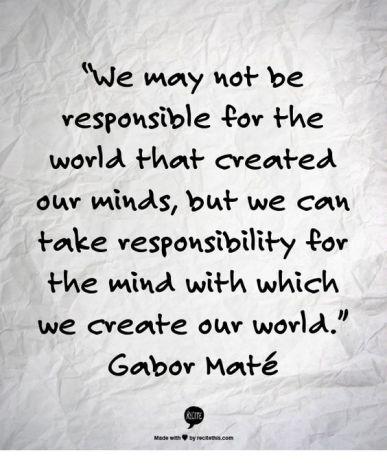Last week, on October 29th, it was Blue Knot day. What is Blue Knot day? Well, it’s a day for recognition to adult survivors of childhood trauma and abuse. Heavy shit – right?
Here’s the thing though… It’s taken me 28 years to accept that I fit that category. I am an adult survivor of childhood abuse. There- I said it, it’s out in the world. However, so are 1 in 4 adults; take a moment to think about that in the context of your friends and family. It’s a pretty big number really.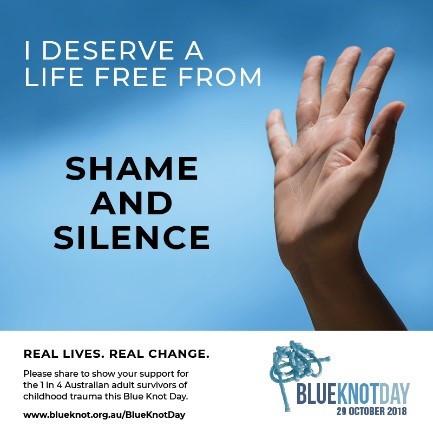
So why did I feel like I didn’t belong to that group? Why is it something that really, until recently, is not something we discuss? We focus on the terrible people who perpetuate these crimes when the victims are young, but once they are older or once the perpetrator is behind bars, we simply forget or move on.
Anyone who knows me, knows I’m generally pretty open to share my story. The problem is, in sharing it, I have disassociated myself with the things that have happened. I retell the stories as if they were a movie or a book, not as if they were real things that happened to me. When someone chimes in with, “I’m so sorry to hear that” or “I had no idea!” I’m always a bit surprised – why are you sorry? and I’m glad you had no idea – I hope I’m not a walking billboard for childhood abuse.
More than anything, these reactions point out that as a society we don’t talk about those children who become adults, and how they cope with every day life. What do we think happens to these kids we read about or see on the news? Do they vanish into thin air? Or now that they are rescued, they are free to live a normal, stable and healthy life?
The reality is they don’t. I don’t.
When I left hospital a few months back, I was looking for audiobooks to listen to while renovating, and I discovered this incredible author and doctor, Gabor Mate. His work largely comes from working in Vancouvers ‘slums’ and treating a tonne of drug addled patients. He made this brilliant connection between the similarities of his addictions and their addictions and moreover, the fact that trauma had played a large part in both his life, and his patients’. People who suffer childhood trauma are more likely to get addicted to something, anything, that fills a void or calms the manic or depressed voice, resulting from childhood trauma.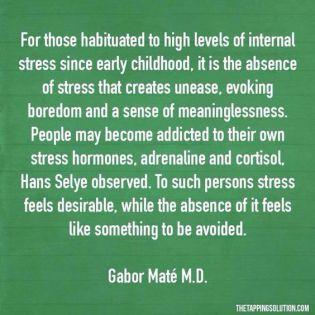
Realistically, what that means is you have three generations of people addicted to heroin with very low likelihood of breaking the cycle.
We’re out there rescuing children from drug addicted parents, but we’re not helping them beyond childhood – so guess what, they become drug addicted parents themselves. We’re rescuing children from sex offenders, who end up being sex offenders themselves.
We’re forever wanting to do the minimal amount of work, to give ourselves the proverbial pat on the back. Then we point the finger at the perpetrators of the things we are ‘fighting against’, not even questioning perhaps if they themselves faced some unfathomable abuse or trauma as a child. Abuse breeds abuse. Trauma breeds trauma. This is something that has been well studied and the correlation is there, black and white. So why do we ignore it?
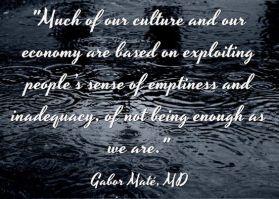
I think it is because it is genuinely easier to paint the perpetrators as evil. As these horrible human beings who deserve no mercy and no second chance. But what would you say to them if they were 10 years old? or 5 years old? Would you paint them with the same brush? Would you brand a child as evil and not deserving of a second chance? Probably not. The problem stems from a systematic denial of thorough treatment and understanding of how childhood abuse and trauma effects the child that becomes the adult.
It doesn’t take an expert to realize that childhood abuse and trauma leads to irreversible and severely damaging psychological changes within the brain. Here are a few I found the most fascinating:
-
Survivors are often on ‘high alert’. Even minor stress can trigger `out of proportion’ responses. Your body continues to react as if you are still in danger, and this can be explained in terms of unresolved prior experience.
-
Survivors often struggle with shame and self-blame. But childhood trauma and its established effects are NOT your fault, even though you may feel otherwise (often because this is what you were encouraged to believe as a child when you were vulnerable and still developing).
-
Survivors engage in current risky behavior. This may be an attempt to solve past unresolved trauma can be the beginning of recovery. This is because you see(i) the `logic’ of your actions (extreme coping strategies can be attempts to manage extreme stress) and (ii) that you are not `bad’ or `mad’ for wanting to escape the unbearable sensations which are the legacy of childhood trauma.
https://www.blueknot.org.au/Resources/Fact-Sheets/fact-sheet-survivors
My whole life, I’ve been waging a war in my head, that until recently, I hadn’t paid a lot of attention to because it was always there and I never questioned if that was normal or not. You see, we all have this internal dialog – something that tells us we need to go to the gym, we need to eat healthy, not turn the alarm on snooze for the 15th time… it also controls our emotions and propensity to react to certain situations. My internal voice is rarely a nice one. She’s pretty fucking mean to be honest and if I forget to take my medication for a few hours, she reeks havoc.
She’s the reason I message friends when I haven’t heard from them in a few days to ask if I have done anything wrong, assuming silence is a form of excluding me from their life.
She’s the reason I am confused constantly how I deserve to have so many beautiful people in my life; I must have manipulated them into thinking I deserve friendship and love.
She’s the reason I feel an undying need to go above and beyond for some people, trying to win their love, affection and friendship – because who I am is shit, but if I do all these incredible things for someone else maybe they won’t realize how terrible I am as a person.
She’s the reason I cried at every wedding up until my own, repeating the words, “no one will ever love you that way – you’ll never ever find love because you don’t deserve it”.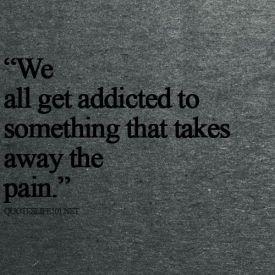
She’s the reason I can’t handle being stranded waiting for someone to pick me up; what if they don’t? Why aren’t they here when I’m ready to be picked up? Obviously they forgot I existed – they’ll probably just wish I would disappear. Maybe they’ll leave me for good.
She’s the reason I hurt myself repeatedly. I deserved to feel pain. I deserved to physically be scarred because I was always emotionally scaring everyone else.
She’s the reason I drank. I could just have one glass because I deserved it. But I could have another because now I started feeling emotions. And then I deserved the whole bottle because it finally fucking shut her up, or so I thought, until it manifested into verbal abuse of an innocent friend/family member/partner or self harm.
The thing is, no one understands what another person is hearing. No one gets that it’s not always a positive, encouraging internal dialog. The reason most people can’t stand to be alone, sober and without distraction is because our own internal dialog is usually one we don’t want to hear, acknowledge and sometimes rebut. For me, the only escape was alcohol, when it wasn’t alcohol it was sleeping tablets because then it would really shut up.
It is an exhausting process being in my head all day every day, and for most people who either have suffered from abuse/trauma or have a mental illness such as depression, bi polar, border line or schizophrenia, it’s the same story if not worse.
So in light of Blue Knot Week, just take a moment to consider that there are probably several people you work with, party with, play sport with, who have suffered as a child and still feel the effects and impact day in and out of that abuse and trauma. There is no magic pill to cure this, but as a community we can be more supportive, more understanding and less judgemental when we genuinely have no idea what the person next to us has experienced. Instead of judging someones out of character traits or undesirable traits, try to understand why they might do what they do, and why they may be a little bit different.
Together we can create a kinder and more understanding world and work towards helping childhood abuse survivors live until a ripe old age.
